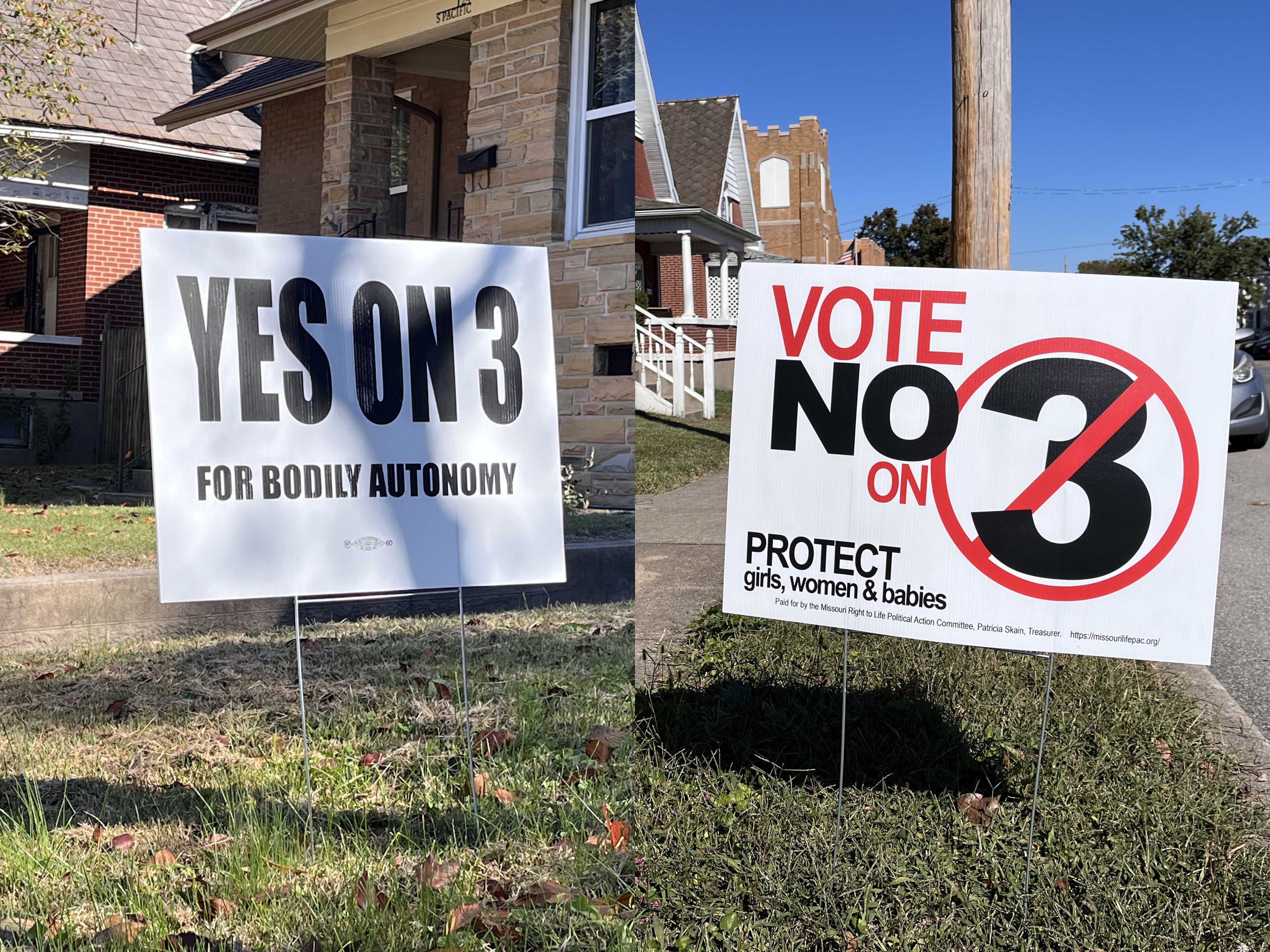Missouri voters to decide on key issues from abortion rights to minimum wage increase in upcoming election
Missouri voters will decide on six critical ballot initiatives this November, addressing issues such as abortion rights, sports betting legalization and a minimum wage hike.
Missouri voters will decide the fate of six ballot initiatives during the Tuesday, Nov. 5, general election. These initiatives include restoring abortion rights, legalizing sports betting and increasing the minimum wage.
Here's what voters should know about each initiative on the ballot.
Amendment 2
Amendment 2 allows Missouri residents to decide whether to legalize sports betting for individuals 21 or older throughout the state.
If passed, the amendment — sports betting agencies DraftKings and FanDuel are funding the campaign in favor of the initiative — will allow sports wagering entities to acquire a license through the Missouri Gaming Commission to offer the service through online mediums, as well as on gambling boats and locations within the sports district. The amendment requires the state to establish sports betting no later than Dec. 1, 2025.
Amendment 2 would allow licensing fees determined by the commission, along with a 10% wagering tax on revenue, to be appropriated for elementary, secondary and higher education institutions throughout the state. Ten percent — or $5 million, whichever is the higher amount — of the 10% wagering tax will support the Compulsive Gambling Prevention Fund. Some will go back to the commission to cover the costs of running and regulating sports betting.
The state estimates a one-time cost of $660,000 and an ongoing annual cost of at least $5.2 million, while initial license fee revenue is estimated to be $11.75 million. The tax revenue amount is unknown but is estimated to bring in up to $28.9 million per year.
Supporters of the proposed legislation include the Winning for Missouri Education campaign, all major professional sports teams in the state and both major gubernatorial candidates in Republican Mike Kehoe and Democrat Crystal Quade.
Proponents argue that the state could generate $100 million over the first five years of legal sports betting. Additionally, supporters argue that hundreds of thousands of Missourians are already placing bets in other states to the detriment of Missouri.
“Let’s fund education is the more effective argument,” Terry Smith, a political science professor at Columbia College, said in an Oct. 14 article from the Missouri Independent. “The argument that is less explicitly made, but I’ve heard from a lot of people, is that people are going to gamble on sports, and right now Kansas and states that we border are making all the money. Why shouldn’t we get our share?”
Opponents, including the Missourians Against the Deceptive Online Gambling Amendment campaign, state Sen. Denny Hoskins and Caesars Entertainment, argue that the amendment’s language allows for “special loopholes” in the tax plan, and that no money is guaranteed to fund education.
Amendment 3
Amendment 3 would amend the Missouri Constitution to enshrine abortion rights, which were banned in the state in 2022, and provide the right to “reproductive freedom", which includes prenatal care, childbirth, postpartum care, birth control, abortion care, miscarriage care and respectful birthing conditions.
The amendment, if passed, would allow women the right to make decisions about their reproductive health care, including abortion and the use of contraceptives, without government interference. The state legislature will be able to enact laws that regulate abortion after fetal viability, which is approximately 23 or 24 weeks into a pregnancy, except in cases of a medical emergency.
Amendment 3 faced several challenges along the way to being certified for the ballot, including four lawsuits, an attempt to raise the threshold of the initiative petition process during the 2024 legislative session and an attempt by Secretary of State Jay Ashcroft to decertify the measure.
Supporters of the amendment include the Missouri Democratic Party and the ACLU of Missouri. Proponents argue that a woman’s decision surrounding abortion, birth control and miscarriage care should be personal, private and decided on by the patient and their family.
Opponents, which include Gov. Mike Parson, U.S. Sen. Josh Hawley and the Missouri Catholic Conference, have argued that abortion is unethical and have claimed Amendment 3 will allow for abortions until birth. In addition, some opponents have claimed that the amendment will allow for legal sex changes for minors without parental consent, although many legal and medical experts say the claims are unfounded.
“The reason why you’ve seen such passion in the pro-life movement or from elected officials who are pro-life is because that reflects the passion of Missouri citizens who are pro-life,” state Sen. Mary Elizabeth Coleman said in a Sept. 25 Missouri Independent article. “Which is to do anything and everything to protect the most vulnerable.”
Amendment 5
Amendment 5 will allow for a new riverboat casino to operate on the Osage River between Bagnell Dam, which is near Lake of the Ozarks, and where it meets the Missouri River.
There are currently 13 licensed riverboat casinos operating in the state. Passage of Amendment 5 would override a 2008 law that limits the state to 13 licensed casinos.
The state estimates a one-time cost of $763,333 and an ongoing annual cost of $2.2 million. Initial fees are estimated to bring in $271,000, ongoing admission and other fees are expected to make $2.1 million annually and the annual gaming tax revenue is estimated to be $14.3 million. The amendment requires all state revenue from issuing gambling boat licenses to be appropriated to early-childhood literacy programs for public elementary schools in Missouri.
Amendment 5 is supported by Bally’s Corp., an entertainment company based in Providence, Rhode Island, that is splitting the costs of the campaign with developer RIS Inc., which owns the land the casino would be built on.
The amendment is opposed by the Osage Nation Native American tribe, which has a planned casino that would have to compete with the Osage River casino.
Amendment 6
Amendment 6 would allow a $3 fee to be collected from civil and criminal court cases in Missouri to help fund salaries and benefits for law enforcement personnel, which includes current and former sheriffs, prosecuting attorneys and circuit attorneys.
If passed, the $3 fee will not be applied if the court costs are waived or covered by the state, county or municipality in question, or if the case is dismissed. No impact will be made on taxes with the passage of this amendment.
The amendment aims to reverse a Missouri Supreme Court ruling from 2021 that found levying of such fees unconstitutional after two men sued after discovering that $3 from their fines and fees stemming from two speeding tickets went to fund sheriffs’ retirement benefits.
Supporters of the amendment include state Sen. Rusty Black, who filed the bill during the 2024 legislative session, and the Missouri Fraternal Order of Police.
“On behalf of the Executive Board of the Missouri Fraternal Order of Police (MO FOP), I am pleased to announce our endorsement of Amendment 6 in support of Missouri’s sheriffs and prosecuting attorneys,” MO FOP president Jay Schroeder said in an Oct. 14 news release in support of the initiative. “Amendment 6 is an important public safety measure. We believe safe communities are critical for our state to have a prosperous future, and the passage of Amendment 6 will provide stability and financial support for benefits for these important members of our law enforcement community.”
Opponents of the amendment include the Reason Foundation, a Los Angeles-based libertarian policy institute. The foundation’s arguments against the initiative are that it will disproportionately affect low-income populations and that law enforcement and the courts should be funded through appropriations and not fees.
Amendment 7
Amendment 7 would amend the state constitution to include language specifying voters in the state must be a U.S. citizen, and would bar ranked-choice voting.
Currently, it is illegal for a non-U.S. citizen to vote in Missouri’s elections. The amendment would change the language in the constitution from, “All citizens of the United States” can vote to “Only citizens of the United States. …”
The initiative would also ban ranked-choice voting, an electoral system where voters rank candidates by preference rather than choosing just one, which limits voters to a single vote per candidate or issue and requires the winner of a primary election to be their party’s sole candidate in the general election. The ban would not apply to nonpartisan municipal elections.
Republican gubernatorial candidate Lt. Gov. Mike Kehoe, state Treasurer Vivek Malek, the Election Transparency Initiative and Honest Elections Project, among others, came out in support of the amendment, calling noncitizen voting and ranked-choice voting schemes perpetrated by left-wing politicians.
“This important measure protects Missouri’s elections from noncitizen voting and Ranked-Choice Voting, two schemes backed by the far-left to fundamentally remake American politics,” Honest Elections Project executive director Jason Snead said in a statement earlier this year. “Thanks to the leadership of Speaker Plocher, Sen. Brown, Rep. Baker, the people of Missouri will have a chance to defend fair elections this November!”
Opponents, including state Rep. Eric Woods and Better Ballot KC, a “grassroots group working to bring ranked-choice voting to Kansas City, Mo.”, argue that the proposal is unnecessary and misleading and hurts local elections by keeping citizens from deciding what type of election they prefer.
Proposition A
Proposition A would establish a $13.75 per hour minimum wage in Missouri by 2025 that would increase to $15 an hour by 2026. The initiative would also require employers to give employees an hour of paid sick leave for every 30 hours they work.
Businesses with 15 or fewer employees would be required to provide their workers with a minimum of five paid sick days each year, which they can use for themselves or to care for ailing family members. Businesses with more than 15 employees would have to offer seven annual sick days. Employees can carry up to 80 hours of earned sick leave over to the next year if they’re unused.
The current minimum wage in Missouri is $12.30. According to a report from the Missouri Independent, the increase would affect more than 562,000 workers, nearly one out of every four. It would also guarantee sick leave for approximately 728,000 workers, more than one out of every three, who currently don’t have it.
The state estimates a one-time cost of up to $53,000 and ongoing annual costs ranging from $0 to $256,000 by 2027. Depending on business decisions, state and local government tax revenue can change by an unknown amount depending on business decisions.
Democratic gubernatorial candidate Crystal Quade, along with the International Brotherhood of Teamsters, Abortion Action Missouri, the League of Women Voters of Missouri and the Missouri Nurses Association, among others, have come out in support of the proposition. Proponents argue that the state’s minimum wage hasn’t kept up with rising costs, and the increase, along with guaranteed sick leave, will ensure Missouri residents can take care of their families.
Republican gubernatorial candidate Lt. Gov. Mike Kehoe opposes the proposition, claiming an increase of minimum wage will cause prices to rise and take jobs away from young workers who are seeking entry-level employment.
Connect with the Southeast Missourian Newsroom:
For corrections to this story or other insights for the editor, click here. To submit a letter to the editor, click here. To learn about the Southeast Missourian’s AI Policy, click here.











